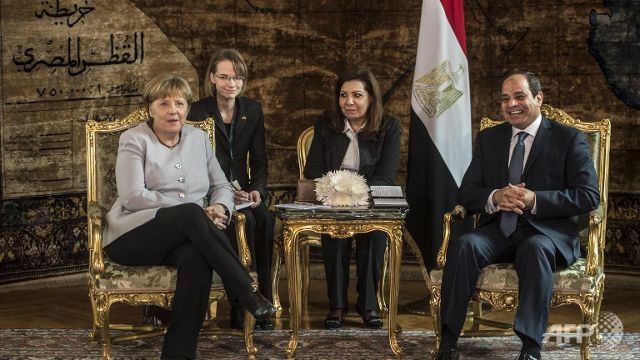Merkel in Egypt to reduce migrant flows
 |
| Egyptian President Abdel Fattah al-Sisi (R) meets with German Chancellor Angela Merkel at the presidential palace in Cairo on Mar 2, 2017. (Photo: AFP/Khaled Desouki) |
Turmoil exploited by people smugglers since the 2011 overthrow of Muammar Gaddafi has made Libya the main gateway for African migrants seeking to make dangerous Mediterranean crossings.
Merkel, who faces elections in September, has been under intense pressure to reduce the number of asylum seekers coming to Germany, which has taken in over one million migrants since 2015.
Her government has urged the North African states to step up border controls and speed up repatriations of migrants whose asylum applications are rejected.
Merkel is scheduled to meet Egyptian President Abdel Fattah al-Sisi on Thursday, followed by meetings with Coptic Orthodox Pope Tawadros II and Sheikh Ahmed al-Tayeb, Egypt's top Muslim cleric. She will depart to Tunisia on Friday to meet Tunisian President Beji Caid Essebsi.
She will "inform herself of the situation of Coptic Christians" and "speak to (Tayeb) about tolerance and the peaceful co-existence of religion," her spokesman Steffan Seibert said in a video uploaded on his Twitter account.
Merkel is joined by a business delegation that could sweeten the diplomacy with investments badly needed by both countries, which are grappling with sluggish economies, militant attacks and high unemployment, especially among youths.
"The chancellor will speak with Sisi about, among other things, economic cooperation and opportunities for German companies," Seibert said.
A major focus in Egypt and Tunisia will be on their troubled neighbour Libya, a largely lawless country that has porous desert borders with Algeria, Niger, Chad and Sudan.
HOLDING CENTRES
"Without a political stabilisation of Libya, we won't be able to stop the human traffickers operating out of Libya who are responsible for by far the most arrivals in Italy," Merkel said in her latest weekly podcast.
The trip is part of a larger diplomatic push by Merkel, who last year visited Mali, Niger and Ethiopia. She had also planned a trip to Algeria last week, but it was called off after President Abdelaziz Bouteflika fell ill.
Germany, which this year holds the G20 presidency, has also announced investment partnerships in Africa with the long-term goals of reducing poverty and deterring people from leaving in the first place.
Last year, Berlin spearheaded an EU agreement with Ankara that helped sharply reduce the influx of migrants through Turkey and western Balkan countries. But as with the Turkey deal, the negotiations with the North African countries have been clouded by human rights concerns.
In particular, an idea floated by Merkel's interior minister - for North African countries to build holding centres for returned migrants - has been rejected by Merkel's centre-left coalition partners and by rights groups.
Foreign Minister Sigmar Gabriel - whose Social Democrats hope to topple Merkel this year - dismissed the idea, saying: "I doubt that all this has been really thought through".
'DODGY DEALS'
Human Rights Watch noted that Egypt banned protests and jailed thousands of people, while outlawing the Muslim Brotherhood movement president Mohamed Morsi whom Sisi, a former army chief, overthrew in 2013.
Repatriating Tunisians and Egyptians who do not need protection can be "legitimate" if they are treated fairly, the New York-based rights group said.
"It's another thing entirely to pursue dodgy deals that could trap asylum seekers and migrants from elsewhere in countries like Tunisia and Egypt that cannot guarantee decent treatment or meaningful access to asylum," said Judith Sunderland, a Europe and Central Asia director for the group.
But Merkel is under huge pressure at home to achieve results in an election year, as the anti-immigration Alternative for Germany party hopes to enter the national parliament for the first time.
Public fears in Germany have been heightened by several militant attacks last year - especially the truck rampage by Tunisian immigrant Anis Amri at a Berlin Christmas market that killed 12 people in December.
A year before, sexual assaults by large groups of mostly North African men on New Year's Eve against women in Cologne provoked outrage in Germany.
What the stars mean:
★ Poor ★ ★ Promising ★★★ Good ★★★★ Very good ★★★★★ Exceptional
Latest News
More News
- Russian President congratulates Vietnamese Party leader during phone talks (January 25, 2026 | 09:58)
- Worldwide congratulations underscore confidence in Vietnam’s 14th Party Congress (January 23, 2026 | 09:02)
- Political parties, organisations, int’l friends send congratulations to 14th National Party Congress (January 22, 2026 | 09:33)
- 14th National Party Congress: Japanese media highlight Vietnam’s growth targets (January 21, 2026 | 09:46)
- 14th National Party Congress: Driving force for Vietnam to continue renewal, innovation, breakthroughs (January 21, 2026 | 09:42)
- Vietnam remains spiritual support for progressive forces: Colombian party leader (January 21, 2026 | 08:00)
- Int'l media provides large coverage of 14th National Party Congress's first working day (January 20, 2026 | 09:09)
- Vietnamese firms win top honours at ASEAN Digital Awards (January 16, 2026 | 16:45)
- ASEAN Digital Ministers' Meeting opens in Hanoi (January 15, 2026 | 15:33)
- ASEAN economies move up the global chip value chain (December 09, 2025 | 13:32)
















 Mobile Version
Mobile Version